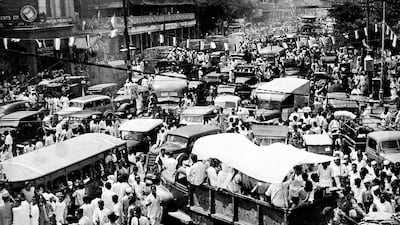My first memory of India was when I was six years old. My parents had brought home a grainy copy of the epic film, Mother India. I didn't understand much, but my childhood memory of the images of women suffering for land and family, and of poverty, remained etched in my mind forever. The connection to homeland was intense. It was overlaid with a scratchy, heartrending soundtrack in a traditional, high-pitched voice, and the vivid sense that is embedded into the DNA of the children of India was a heritage of anguish.
_____________________
Read more:
Sharmeen Obaid-Chinoy's HOME1947 reimagines partition
Painful memories of partition should spur on modern India
The story of Pakistan's improbable pursuit of nuclear weapons
_____________________
Members of my family are among those children of India who were once removed from there. My great grandparents had left British India and the famine in Gujarat at the turn of the 20th century. They travelled to British colonies in East Africa. Half a century later, the tectonic shifts of the British empire catapulted them to London at a time when their home country was about to gain independence.
I was born in London. But the experiences of partition nonetheless linger over me and millions of others living in Britain who share a subcontinental heritage. Every family, every story is different and heart-breaking. I rarely come across any winners.
This year is the 70th anniversary of the partition. At midnight of August 15, 1947, British rule formally came to an end, with India and Pakistan beginning their independent journeys. In the process, more than 10 million people were displaced and over a million people died in the violence that ensued after the partition. That was not the end. The parameters of partition precipitated a bloody war in 1971, as the province of East Bengal fought for independence and eventually became Bangladesh.
_____________________
More from the author:
There is no excuse for the global problem of unequal pay for equal work
I long for the August silly season, so I can rejuvenate myself
Women must stop being portrayed as damsels in distress on the big screen
_____________________
Seven decades on, the trauma of partition continues to affect the politics of the subcontinental diaspora in the United Kingdom.
The divide-and-rule policy of the British administration in India has left a lasting impact on individuals and is felt among Britain’s communities of subcontinental heritage. Despite our commonalities, we perceive ourselves to be – and are perceived as – different from each other, even though many – like me – may only have one connection to Mother India herself. The politics of partition came to define how we see ourselves in the UK and how we engage with each other.
When my ancestors left India for colonised East Africa, brown people were positioned above black people, but below the white British. Travelling again to the UK, they found themselves in a new class of people of colour. This time, they were united by the discrimination and racism facing them, but forcefully divided by faith and their newly-formed countries of origin.
British foreign policy towards the three nations is often a direct corollary to how those of subcontinental descent are engaged with in the UK. Former prime minister David Cameron, who reached out to India's premier, Narendra Modi, was feted by the British Hindu community. In stark contrast, Britain's diverse Muslim population is cast in a devilish and poor light and categorised as Pakistani and Bangladeshi. How and why these nations are framed is a matter of discussion.
The question is whether the British population of subcontinental origin will ever be entirely free to shape their own narrative.
This heightening perception of subcontinental-origin communities being backward immigrants is being reinforced by a resurgence in British nationalistic nostalgia. It stems from the idea that the empire was a benevolent and benign force of good in India. The British brought railways and the civil service and civilised the savages. All hail the empire.
British subcontinental communities continue to face this insulting attitude, as though they are still in need of being civilised and disciplined. There is a wilful lack of recognition that Britain developed and built its wealth at the expense of India and its other colonies.
It was the images of Mother India flickering on the screen that I saw when I was six that helped me understand that human beings can have a primordial connection to a land. Mother India still holds the connection to all her children wherever they are.

